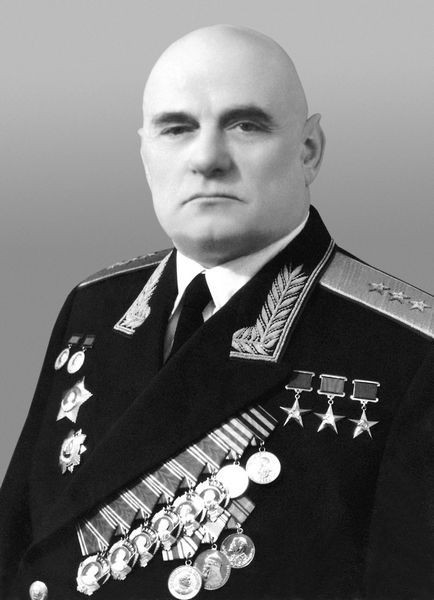Colonel-General Boris Vannikov did not fight on the front lines during World War II. Two his brothers, Lazar (a civil engineer by profession) and Veniamin (a Party functionary) volunteered for the militia in 1941 and were killed during the defense of Moscow in the winter of 1941. In contrast, Boris did not see active service. However, as a narkom ("people's commissar" or minister) of armaments from February 1942 to the end of the war (after being deputy people's commissar of armaments from July 1941 to February 1942), he aided the Soviet war efforts as much as a front-line general.
Boris Vannikov was born to a poor family in 1897 in the settlement of Bib-Eibat (now Bibi-Heybat, a district of Baku, the capital of the Republic of Azerbaijan). His father worked in the oil fields of Baku, where young Boris began working as a mechanic. By 1917 he was a foreman for the construction of a road through the oil fields. In 1918 he joined the Red Army and took part in the Russian Civil War in the Caucasus. In 1920, Vannikov moved to Moscow, where he worked at various supervisory institutions, while studying at the Bauman Higher Technical School, the oldest technical university in Russia. Upon graduation in 1926, Vannikov worked as an organizer of heavy industry. From 1936, he worked at the People's Commissariat (Ministry) of the Defense Industries. In January 1939 this Commissariat was split in two, and he became – the first People's commissar of armaments of the USSR.
In June 1941, two weeks before Germany's attack on the Soviet Union, Vannikov was arrested by the NKVD (a precursor of the KGB) on the grounds that he was a German spy. He was thrown into a solitary cell of the notorious Lubianka prison, where he was interrogated, and tortured. In July 1941, when the war began and the Red Army was soon in retreat, acting via Vannikov's interrogators, Stalin himself ordered Vannikov to put into written form his proposals for evacuating the Soviet arms industries eastward. After Stalin personally read Vannikov's proposals, he not only ordered that Vannikov be released from the prison, but also appointed him as deputy people commissar of armaments. In July 1942 Vannikov received the rank of major-general.
Under Vannikov's supervision during the war 776 million artillery and mortar shells of various were produced. These included among them 14 million jet-propelled shells, i.e. military rockets, millions of cannons, and other types of weapons.
In the spring of 1945 Vannikov visited the city of Gorky, where the new 85-mm cannon was being tested. When he came to Gorky with his wife Revekka, they were met by Mark Orlovskii, the director of the plant where the new weapon was to be produced. By chance, this week was just before Passover week of 1945. Vannikov addressed the following request to Orlovskii: "Arrange a Passover seder for us, and let it be according to all the rules of the Jewish people."
Mark Orlovskii was living with his parents, who were traditional Jews, and, therefore, he took Vannikov and his wife to their home. The seder was fully Orthodox, and Boris Vannikov was very satisfied. (Fedor D. Sverdlov, Entsyklopediia evreiskogo geroizma, [Moscow: Dograf, 2002], p. 253).
After the war, Vannikov was appointed head of the Main Board for the Nuclear Industries, i.e., he coordinated the work for the development of Soviet nuclear weapons. In 1947 he suffered a stroke. Nevertheless, Vannikov continued to supervise this development. He was the first person to be awarded the title of Hero of Socialist Labor three times. A second stroke, in 1958, led to his retirement. Vannikov died in 1962 and was buried with full military honors at the foot of the Kremlin walls. A bronze monument to Vannikov was erected in his native Bibi-Heybat. In the 1990s the authorities of the independent Azerbaijan demolished the monuments to the Bolshevik leader Sergei Kirov and to the "26 commissars of Baku," but did not harm the monument to Vannikov.

